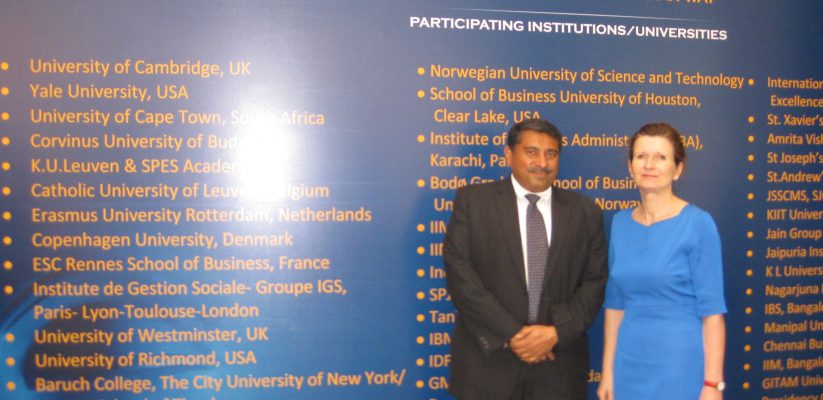I was invited to address the international audience of the Authentic Leadership – The Indian Way Conference on the 9th and 10th of January 2014. The event was hosted by the IFIM Business School, one of the rapidly developing, prestigious academic institutions in Bangalore in cooperation with the European SPES Forum, Leuven, Belgium and the Business Ethics Centre of the Corvinus University of Budapest, Hungary. Educators from different disciplines and professionals from a variety of industries were brought together to discuss human values, ethics and spirituality in doing business in India. The conference aimed to identify new directions for spirituality and ethics and to recommend more responsible leadership and business behaviours for the future.
Papers and presentations were offered in the following themes:
1. Spiritual orientations to business in different Hindu/Buddhist traditions
2. Contribution of spirituality to renew contemporary management theory and praxis
3. Influence of spirituality and ethics on the commitment of people and organisations to sustainability and justice
4. Promising ethical and sustainable business models in India to that of other parts of the world
5. New leadership roles emerging in Indian business
6. Meaningful way of inspiration of spirituality on entrepreneurship
7. Similarities and differences between Indian and European philosophies of leadership
A number of presenters talked about the importance of building on the spiritual and cultural traditions in encouraging values based and ethical behaviour in organisations and society.
One of the keynote presenters, Radhakrishnan Pillai talked about his passion for introducing cultural tourism and encouraging people from all around India and beyond to visit the temples and heritage sites and learn about the rich history and traditions of the country. In his efforts to educate young Indians and inspire them to think about responsible leadership Radhakrishnan Pillai published a book called Corporate Chanakya on Leadership. Chanakya was an Indian teacher, philosopher, and royal advisor who lived between 370 BC and 283 BC. Originally a professor of economics and political science at the ancient Takshashila University, Chanakya managed the first Maurya Emperor Chandragupta’s rise to power at a young age. His ideas on leadership, strategy and managing self and relationships are still relevant today and can inspire current and future leaders.
This is a book that I shall read myself and incorporate into my teaching of leadership in a multi-cultural and historic context.
This conference made me realise yet again the importance of open and honest discussions about values, purpose and how to lead a meaningful life. These are issues vital to a fulfilling personal and organizational life, yet most of us are too busy to consider them even periodically.
The organisers of the conference had an open door policy and the students and faculty members of IFIM Business School could attend the presentations free of charge. It gave delegates an opportunity to exchange ideas and talk with a wide range of people and discuss both the conference themes and personal interests getting a more in-depth understanding of the opportunities and challenges of authentic leadership development in India and beyond.
About the Author: Dr. Katalin Illes
Dr Katalin Illes is a Principal lecturer in Leadership and Development at Westminster Business School. She has a wealth of experience in teaching Leadership, Personal Development, Management Development and Intercultural Communication on post-graduate and executive programmes.
Dr Illes is a passionate promoter of transformational change through leadership development and has extensive international work experience. Over the past 20 years Katalin Illes held responsible positions at Anglia Ruskin University, in Cambridge, at Heriot-Watt University in Edinburgh and worked in higher education institutions in China, Denmark, Finland, France, Germany, Hungary, Iceland, India, Japan, Malaysia and Switzerland.
She has published over 70 academic papers and presented her views and findings at international conferences. She has been awarded visiting professorships in five countries and regularly acts as External Examiner, Key Note Speaker and Reviewer.
Her current research interests include ethical leadership, spirituality and leadership, building trusting relationships in organisations and innovative ways of developing leaders.


